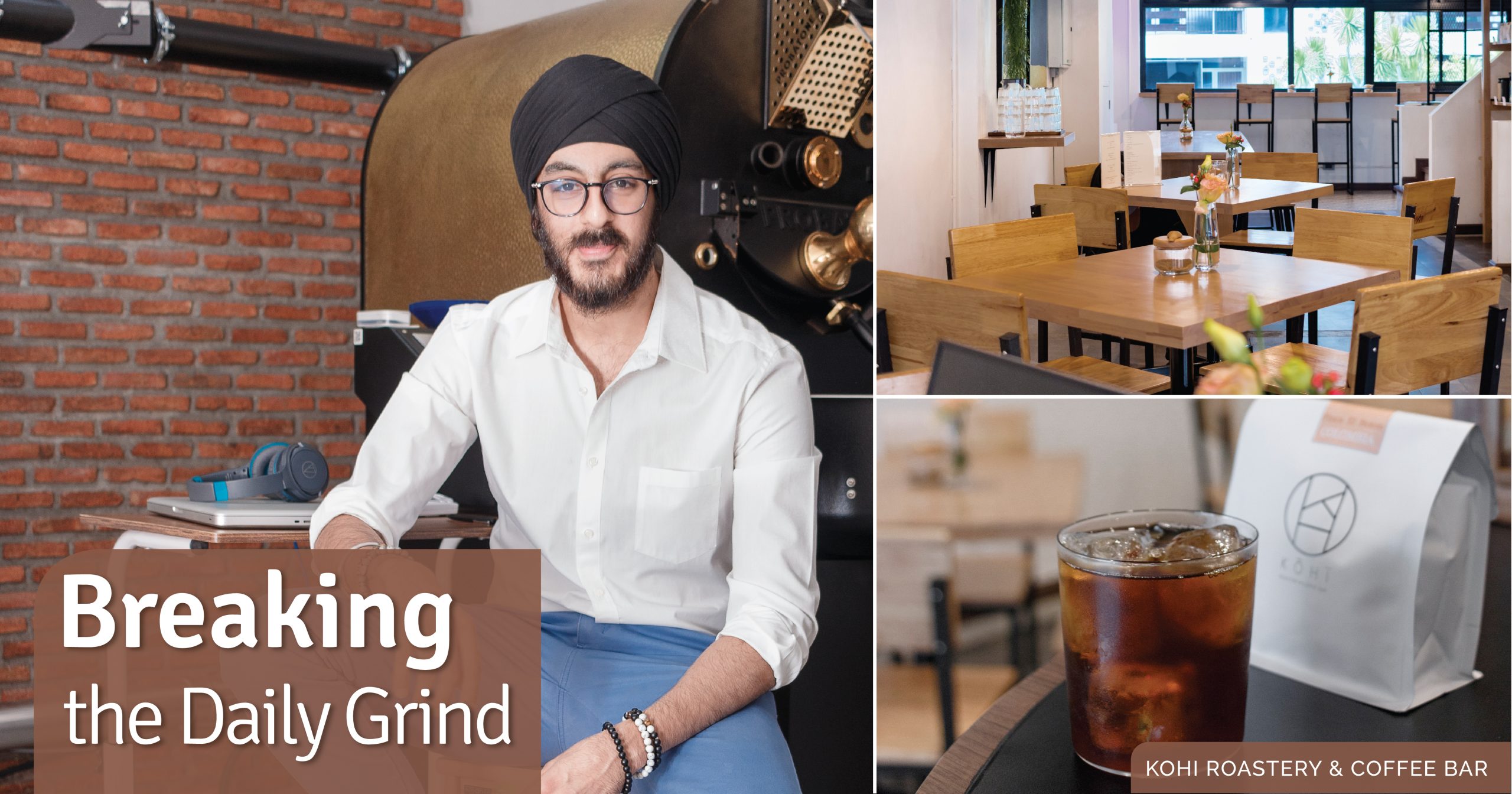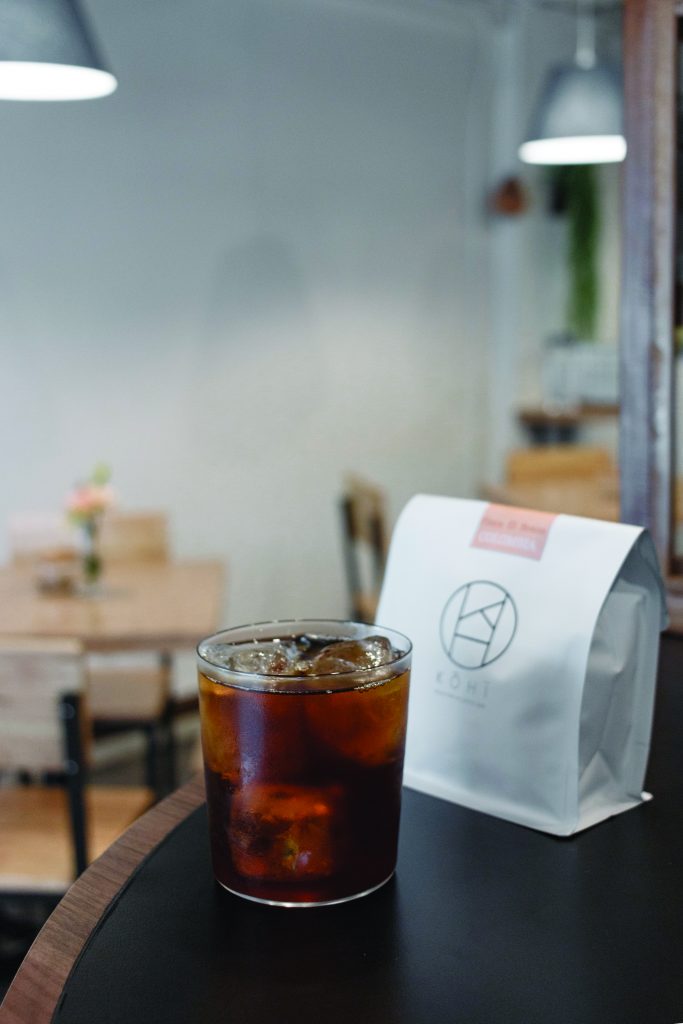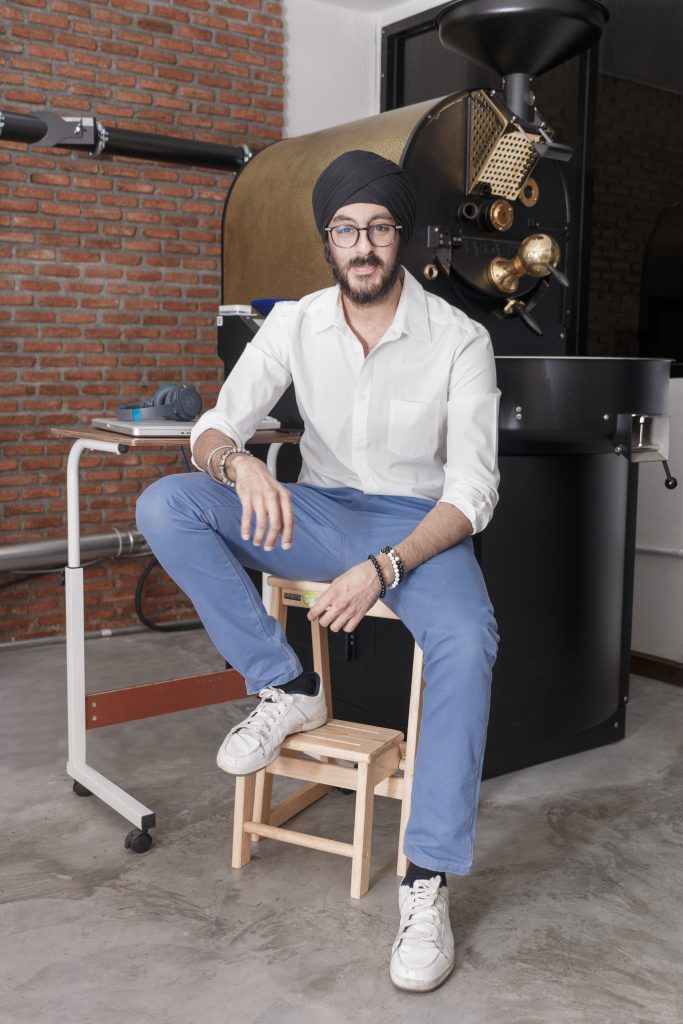Kavin Phinichkusolchit is brewing change in Bangkok’s specialty coffee scene one well-balanced cup at a time.
By Aiden Jewelle Gonzales
As Kavin Phinichkusolchit deftly brews an impeccable pour-over with fresh coffee grounds roasted to perfection in-house, he waxes eloquent on the intricacies of specialty coffee. “Coffee is an art, a science and above all, a language,” he imparts with all the passion of someone whose calling is their stock-in-trade. It is this certainty that produced the family venture Kohi Roastery & Coffee Bar, which was the brainchild of a trio of passionate coffee drinkers: Kavin himself, and his cousins Namdev Sachathep and Ravi Sachathep.
Kohi is a direct translation of coffee in Japanese, a reference to Kavin’s childhood and adolescence in Japan, where he was first introduced to good coffee. The 27-year- old, who was born in Thailand and is a fourth-generation Thai-Indian, manages the day-to-day affairs of the business, which involves the supply and wholesale of single- origin coffee beans to other coffee shops, hotels, and resellers.
As we bask in the beautifully minimalist aesthetic of his coffee bar in Park Avenue, Ekkamai, Kavin takes Masala on a tour of his roasting process while enlightening us on the beauty of coffee in its purest form.
Tell us more about the art of specialty coffee. What about this industry appealed to you?
I’m a coffee connoisseur, and I wanted to do something related to coffee for a long time. Although coffee is an everyday staple for many, I realized that there is a gap between the best possible coffee quality in Thailand and being served the best coffee.
When people taste specialty coffee, it takes them to a different world where they can discover flavour notes such as vanilla, blueberry, caramel, etc., which are not infusions but rather the taste of the coffee bean. I wanted to share this appreciation for pure coffee, without all the bells and whistles, here in Thailand.
Aside from your family history here, why choose Thailand to set up your business?
There are three main areas in which coffee is grown: Latin American, Africa and Asia. However, Thailand is now also going through their own transition into specialty coffee, and that’s very exciting.
The lush jungles of northern Thailand will produce varietals that have their own unique flavour compared to say, the same plant grown in the rocky hilltops of rural Kenya. I can’t wait for people to discover what Thailand’s coffee crop has to offer.
What is the concept behind Kohi Roastery & Coffee Bar?
Our goal is to change the general public’s perception of coffees, especially Thai coffees. To do that, we control every part of the process we can, by producing and serving everything in-house. We have a vertically structured five-storey‘shophouse’ in Ekkamai, and on the first floor you will find our roasting room where we store the coffee beans and roast.
Rather than labelling the second floor a ‘café,’ we refer to it as more of a showcasing space, where customers can discover their favourite brew from our single-origin coffee offerings, with the help of Mong, our head barista. With a Nordic and Japanese- inspired outlook, our space is minimal but aesthetically pleasing, and people are welcome to hang around or get work done.
Bangkok has recently seen an explosion of independent coffee and tea shops. What makes your concept unique?
We pay attention to the quality of our coffees rather than trying to please the crowd. Our menu is very simple, offering only drinks that will allow the customer to identify the individual coffee notes. We want the coffee to shine, rather than extraneous gimmicks.
People usually associate coffee with bitterness because they’re exposed to the practically-burnt coffees served at the majority of coffee shops. Most people don’t even know that coffee is a seasonally-grown fruit, and that what we consume is the seed. Sabique, our head of operations and roasting, uses his decade of expertise to make sure we roast each bean to the optimal level to bring out its flavours. For many people, the tastes we can coax out of local beans is a revelation.
From the grinder and the espresso machine (which we calibrate twice a day), to the cups and even the ice cubes, everything is purely about the coffee.
You said you keep your menu simple. What is your main focus?
We highlight filter coffees, specifically pour-overs, so that you can identify the tasting notes of each coffee. It’s the best way for us to showcase our roasting capabilities.
To complement our coffees we use the best ingredients. For example, for our Espresso Tonic we use Fever Tree tonic imported from London.
Where do you source your beans?
Single origin is our theme, as we feel it is important to appreciate where the coffee comes from. Every coffee has a distinct and complex profile so we prefer to present the coffee the way it is produced from one single plantation.
For our espresso we use just one bean as our base, an experimental award- winning bean from Chiang Mai called ‘Hey 19.’ For our filters, we have five different selections of beans: from Chiang Mai, Colombia, Ethiopia, El Salvador, and Rwanda. As micro-roasters, we work with top-grade coffee beans sourced directly from the farm.
What exactly is micro-roasting? Can you walk us through your roasting process?
Micro-roasting means that we roast coffee beans in batches, not en masse. There are so many properties locked in coffees and it is our jobs as roasters to unleash those luscious flavor notes.
First, we receive the raw (unroasted and green) coffee beans and check them for defects. We run a small amount of each coffee through our sample roasting machine, which will use a software to set different roasting profiles.
At Kohi, we create about eight profiles for new coffees, and after each one has rested, we hold a ‘cupping session,’ where we analyse the aromas, body, mouthfeel and taste of each profile to find the best one for our customers.
How would you address the growing environmental and ethical concerns behind the consumption of products such as coffee?
We’re 100 percent plastic-free. Everything we do here is eco-friendly, from the cups, to the straws, to the take-away packaging.
In the long run, as we expand, I do want to work directly with farmers to make things more sustainable, especially with Thailand’s burgeoning coffee industry.
What do you think the future of Thailand’s coffee industry looks like?
The specialty coffee scene has grown tremendously in Thailand, with vendors discovering new and innovative ways of producing coffee. There is currently a 90 percent import duty for all imported coffee beans, which can be an issue as Thailand does not have the natural resources to produce the best coffees, but this is changing slowly but steadily.
What is your long-term goal here at Kohi?
We want people to understand that Thai coffees can compete on a global scale, and we want Thai people to be more knowledgeable about the coffees they consume or even serve. It is important that customers are aware of where the beans are sourced from, whether or not they are sourced ethically, and that they understand the effort that goes into the coffee before it is served. Only then can coffee truly be appreciated.
To learn more about Kohi Roastery & Coffee Bar, follow them on Instagram @kohi_roastery, or visit them at Park Avenue, Ekkamai, open from 8am to 6pm daily, except on Mondays.









